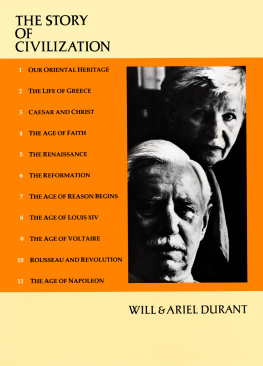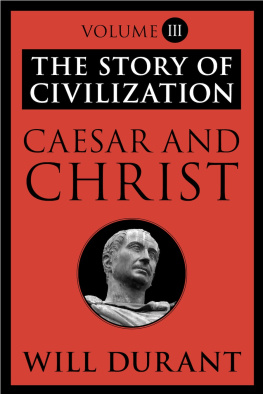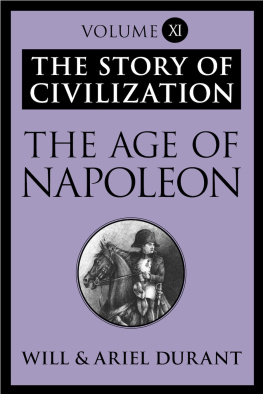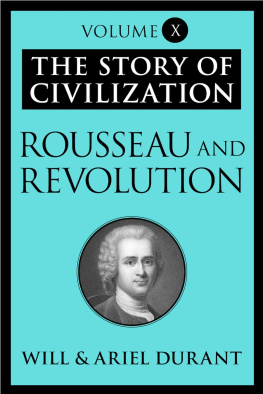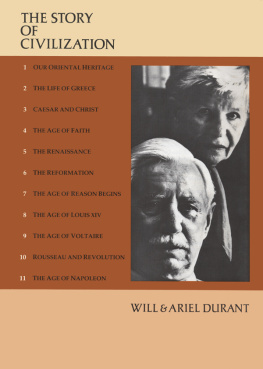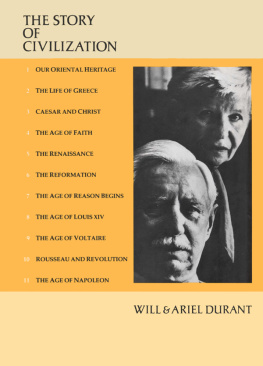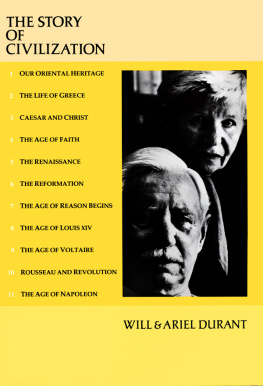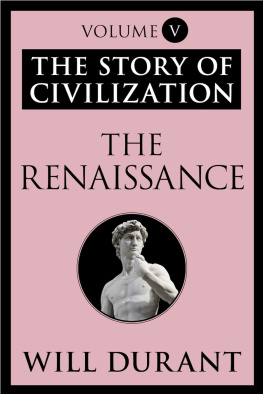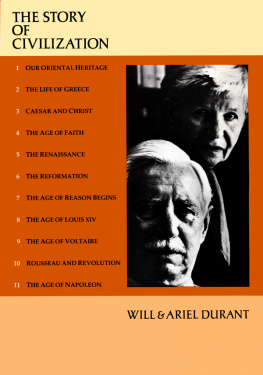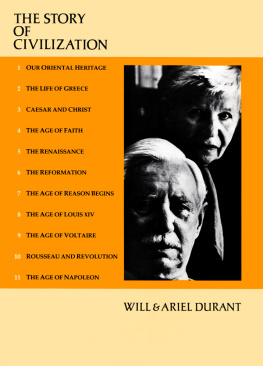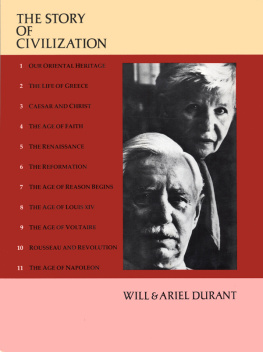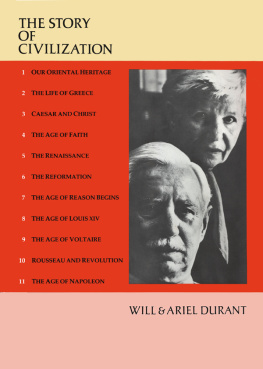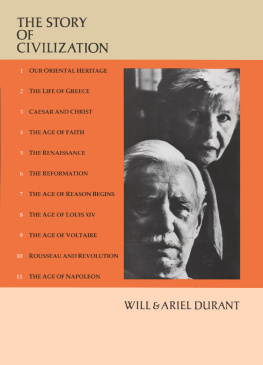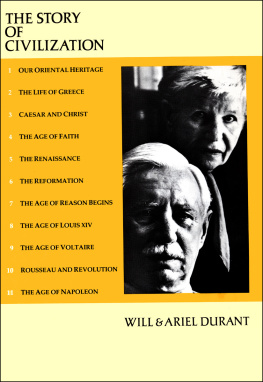
BY WILL DURANT
The Story of Philosophy
Transition
The Pleasure of Philosophy
Adventures in Genius
BY WILL AND ARIEL DURANT
T HE S TORY OF C IVILIZATION
1. Our Oriental Heritage
2. The Life of Greece
3. Caesar and Christ
4. The Age of Faith
5. The Renaissance
6. The Reformation
7. The Age of Reason Begins
8. The Age of Louis XIV
9. The Age of Voltaire
10. Rousseau and Revolution
11. The Age of Napoleon
The Lessons of History
Interpretation of Life
A Dual Autobiography
Copyright 1944 by Will Durant
Copyright renewed 1972 by Will Durant
ALL RIGHTS RESERVED
including the right of reproduction
in whole or in part in any form
Published by Simon and Schuster
A Division of Gulf & Western Corporation
Simon & Schuster Building
Rockefeller Center
1230 Avenue of the Americas
New York, New York 10020
www.SimonandSchuster.com
SIMON AND SCHUSTER and colophon are trademarks
of Simon & Schuster
Library of Congress Catalog Card Number 35-10016
ISBN 0-671-11500-6
ISBN: 978-1-4516-4760-0 (eBook)
TO ARIEL
Preface
T HIS volume, while an independent unit by itself, is Part III in a history of civilization, of which Part I was Our Oriental Heritage, and Part II was The Life of Greece. War and health permitting, Part IV, The Age of Faith, should be ready in 1950.
The method of these volumes is synthetic history, which studies all the major phases of a peoples life, work, and culture in their simultaneous operation. Analytic history, which is equally necessary and a scholarly prerequisite, studies some separate phase of mans activitypolitics, economics, morals, religion, science, philosophy, literature, artin one civilization or in all. The defect of the analytic method is the distorting isolation of a part from the whole; the weakness of the synthetic method lies in the impossibility of one mind speaking with firsthand knowledge on every aspect of a complex civilization spanning a thousand years. Errors of detail are inevitable; but only in this way can a mind enchanted by philosophythe quest for understanding through perspectivecontent itself with delving into the past. We may seek perspective through science by studying the relations of things in space, or through history by studying the relations of events in time. We shall learn more of the nature of man by watching his behavior through sixty centuries than by reading Plato and Aristotle, Spinoza and Kant. All philosophy, said Nietzsche, has now fallen forfeit to history.
The study of antiquity is properly accounted worthless except as it may be made living drama, or illuminate our contemporary life. The rise of Rome from a crossroads town to world mastery, its achievement of two centuries of security and peace from the Crimea to Gibraltar and from the Euphrates to Hadrians Wall, its spread of classic civilization over the Mediterranean and western European world, its struggle to preserve its ordered realm from a surrounding sea of barbarism, its long, slow crumbling and final catastrophic collapse into darkness and chaosthis is surely the greatest drama ever played by man; unless it be that other drama which began when Caesar and Christ stood face to face in Pilates court, and continued until a handful of hunted Christians had grown by time and patience, and through persecution and terror, to be first the allies, then the masters, and at last the heirs, of the greatest empire in history.
But that multiple panorama has greater meaning for us than through its scope and majesty: it resembles significantly, and sometimes with menacing illumination, the civilization and problems of our day. This is the advantage of studying a civilization in its total scope and lifethat one may compare each stage or aspect of its career with a corresponding moment or element of our own cultural trajectory, and be warned or encouraged by the ancient aftermath of a modern phase. There, in the struggle of Roman civilization against barbarism within and without, is our own struggle; through Romes problems of biological and moral decadence signposts rise on our road today; the class war of the Gracchi against the Senate, of Marius against Sulla, of Caesar against Pompey, of Antony against Octavian, is the war that consumes our interludes of peace; and the desperate effort of the Mediterranean soul to maintain some freedom against a despotic state is an augury of our coming task. De nobis fabula narratur: of ourselves this Roman story is told.
I wish to acknowledge the invaluable and self-sacrificing aid of Wallace Brockway at every step in the preparation of this book; the patience of my daughter, Mrs. David Easton, and of Miss Regina Sands, in typing 1200 pages from my minuscule script; and above all to the affectionate toleration and protective guidance accorded me by my wife through many years of dull and plodding and happy scholarship.
Human, All Too Human, Eng. tr., New York, 1911, vol. II, p. 17.
Table of Contents
List of Illustrations
Maps of Ancient Rome and Ancient Italy and Sicily will be found on the inside covers. A map of the Roman Empire faces .
INTRODUCTION
ORIGINS
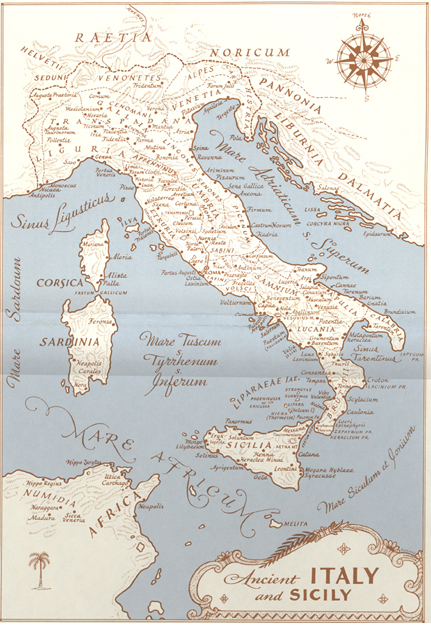
CHAPTER I
Etruscan Prelude
800-508 B.C.
I. ITALY
Q UIET hamlets in the mountain valleys, spacious pastures on the slopes, lakes upheld in the chalice of the hills, fields green or yellow verging toward blue seas, villages and towns drowsy under the noon sun and then alive with passion, cities in which, amid dust and dirt, everything from cottage to cathedral seems beautifulthis for two thousand years has been Italy. Throughout the whole earth, and wherever the vault of heaven spreads, there is no country so fair: thus even the prosaic elder Pliny spoke of his fatherland. Like a spine along the great peninsula ran the Apennines, shielding the west coast from the northeast winds, and blessing the soil with rivers that hurried to lose themselves in captivating bays. On the north the Alps stood guard; on every other side protecting waters lapped difficult and often precipitous shores. It was a land well suited to reward an industrious population, and strategically placed athwart the Mediterranean to rule the classic world.
The mountains brought death as well as splendor, for earthquakes and eruptions now and then embalmed the labor of centuries in ashes. But here, as usually, death was a gift to life; the lava mingled with organic matter to enrich the earth for a hundred generations.and the Renaissance, still run in Italian blood, only awaiting a good cause or argument. Nearly all the men are virile and handsome, nearly all the women beautiful, strong, and brave; what land can match the dynasty of genius that the mothers of Italy have poured forth through thirty centuries? No other country has been so long the hub of historyat first in government, then in religion, then in art. For seventeen hundred years, from Cato Censor to Michelangelo, Rome was the center of the Western world.
Those who are the best judges in that country, says Aristotle, report that when Italus became king of Oenotria, the people changed their name, and called themselves no longer Oenotrians but Italians. Just as the Romans called all Hellenes Graeci, Greeks, from a few Graii who had emigrated from north Attica to Naples, so the Greeks gradually extended the name Italia to all the peninsula south of the Po.
Next page
